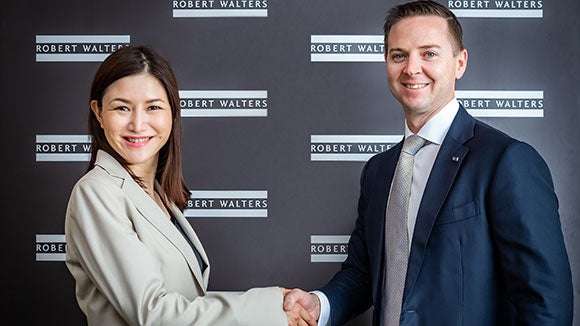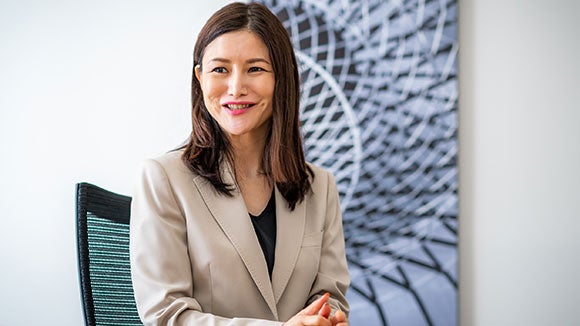New York Lawyer and TV Commentator Mayu Yamaguchi
speaks with Robert Walters Japan Managing Director Jeremy Sampson

How a global perspective changed my view of work
Mayu Yamaguchi, a New York lawyer and occasional TV commentator, visited Robert Walters Japan to share her career path. She believes that her time studying in the United States encouraged her to fundamentally rethink her outlook on her own career as well as on work in general. After leaving the Ministry of Finance and encountering more global perspectives, Yamaguchi came to appreciate the importance of considering her career on her own. She reveals the differences that she has identified between Japan's traditional views on work and global attitudes. Jeremy Sampson, Managing Director at Robert Walters Japan, spoke with her about working styles within Japan, and the significant changes that they are going through.
Achieving a childhood dream of working at the Ministry of Finance, only to resign two years later
Sampson opened the discussion with the topic of career choices, asking what it was specifically about the Ministry of Finance that she found appealing, and if she ever considered any other career options. Yamaguchi explained that her decision was made long ago, after watching a TV show.
"Empress Masako [who worked as a diplomat] married when I was in Year 5 at primary school. There was a series called 'Kanryo-tachi no Natsu' (literally 'The Bureaucrats' Summer'), which was modelled after the Ministry of Economy, Trade and Industry that was aired on television around the same time. These influences encouraged me to seek a job working at the centre of the state. From then on, I had my heart set on the government buildings in Kasumigaseki."
Despite achieving her childhood dream of working at the Ministry of Finance, she left her position after two years. In response to a question from Sampson about the inspiration behind this new direction for her at the time, Yamaguchi recalled what made her feel uncomfortable at that workplace.
"I did like the Ministry of Finance as an organisation, but the office was structured with a typically Japanese, 'family-like' framework. Anything that the boss said was absolute, and women had strictly fixed roles in the workplace. This arrangement can be comfortable in some ways, though sometimes I was unable to fit in with how things ran there and felt somewhat out of place. It was at this time that I began reconsidering what I really wanted to do in my life."

Disillusionment with a "family-like" organisation
Yamaguchi went into more detail about what this "family-like" workplace environment was, focusing on two aspects: care and control.
"In terms of care, there was a policy of looking after new recruits for a very long time, someone was always ready to lend me a helping hand without me having to ask. On the other hand, there was a strong sense of control throughout the organisation, where our future direction was determined solely by the organisation itself. There was a strong sentiment that those in junior positions had to comply and act in a certain way because their superiors were always looking after them. I felt that I would lose control over my own life if I stayed there too long."
"The values and mindset at the organisation worked to gradually shift people's own personal values and beliefs. This process was not achieved by barking directives; the structure of relationships at the workplace encouraged people to cooperate and move in line because 'we are a family.' This can be pleasant in some ways, but it is also unnerving. Also, I noticed that organisations in Japan have an attitude of exclusionism, where employees working a second job or belonging to a separate community were ostracised and treated different. Because you belong to the 'family,' there is a general sentiment that everyone needs to dedicate their all to the family— they need to offer 100% or even 200% commitment. Within this environment, your life becomes entirely entwined with the company before you know it."
Sampson also noted some differences between work styles at traditional organisations in Japan as compared to global companies.
"Japanese people are dedicated to their work and have a strong sense of loyalty. As such, they often tend to take care of the people and things around them. While companies ask employees for their loyalty, it is equally important to be loyal to yourself and to your family. In this way, loyalty is not solely about the company that you work for. I think that it is not right to put your company's needs before your own."
This description of a "family-like" organisation holds true in many ways for a large number of traditional companies in Japan. After feeling slightly out of place in this structure and rethinking what she wanted to do, Yamaguchi resigned from the Ministry of Finance. She began working as a lawyer by making use of the legal credentials she gained while attending university.

Encountering barriers while studying in America
One significant factor that spurred Yamaguchi to rethink her career was her time studying at Harvard Law School in the United States. The biggest struggle Yamaguchi faced was not the language barrier per se; rather, it was the difference in the communication style.
Yamaguchi looked back to the start of her studies abroad. She recalls that her preoccupation with her English ability made her unable to talk at all. Feeling that she could not go on like this, she wrote an essay describing her situation and handed it to her lecturer.
"My lecturer told me that it was concerning at first whether I was actually engaged with the things around me. It was because I did not say anything, and that was a relief to see that I had been thinking seriously about things. My lecturer's response made me realise that everyone has his or her own way of expressing themselves, and that I should communicate in a way that suits me. Japanese people often correct their own grammar as they speak, but I decided that I would not get all flustered if I forgot to put an 's' at the end of a verb like 'she talks.' I would just keep the conversation going."
Yamaguchi recounts that it was at this point when she appreciated the importance of conveying the message about the skills she has, no matter how she did it.
"In communication, our responsibility is to ensure that our message is delivered to the recipient. For example, I have my own beliefs, experiences and history, but I cannot expect everyone around me to understand my background if I remain silent. I began to understand the need to express myself so that other people could understand what I had to say."
Sampson also noted that he has met some Japanese people who wished to change jobs and work at a global company, but who had difficulties with communication. He emphasised that "in terms of communication skills, there are definitely ways of expressing yourself that are not dependent on your level of English ability."
"I continued to think about what I wanted to do": new discoveries at Harvard
Her time at Harvard prompted her to contemplate two important questions: “Who am I?” and “What do I want to do in my life?”
"When I was in Japan, I did not pay much thought to what I actually wanted to do. In a sense, it was as if I was moving like a train on a fixed track." However, the people that she met at Harvard had a very different outlook on life.
"For example, Steven Spielberg delivered a graduation ceremony speech at Harvard. Throughout his speech he repeatedly asked, 'Do you know who you really are?' I realised that I needed to seriously consider what kind of life I wanted to lead as an individual, and not as a worker at a company. I needed to think about the kind of work I wanted to do, the corporation where I would do it, as well as what I wanted to ultimately strive towards in my efforts."
"During my time abroad, I learnt that I needed to continually ask myself what I really wanted to do. It's great if you lead a life like Spielberg's, who received a camera when he was 18 and came to find himself in the ideal environment to thrive. However, this is not the reality for many people. You can view changing jobs or other life events as opportunities to understand more about yourself while talking with consultants. It is vital to go through this process and constantly engage with the question of what your identity is, what you want to achieve, and how you want to contribute to society."
Sampson expressed his agreement after hearing about Yamaguchi's experience. "When the goals of individuals on their own career paths align with the goals of their organisations, they are driven to be proactive. When people pursue the career path in addition to the goals of their own organisations, they will act with initiatives. Working with initiative to achieve your own objectives involves challenging your own horizons. This is extremely important in everyone's own life, and global companies show demand for talented people who possess this kind of outlook."

Considering changing jobs allows you to "get in touch with yourself"
Yamaguchi remarked, "In today's society, we have begun to depart from the idea that achieving job security is only possible by staying in one company until retirement. When employees advance in age, there will be a big difference between people who seriously considered and took action to gain expertise and people who paid no thought to their future in this regard."
Sampson expressed his agreement, noting that he also senses significant changes in the recent state of Japanese companies as well as the style of work conducted within them. As such, he emphasised that "there is one vital thing to remember and enact, whatever organisation you may belong to."
"It is crucial to be passionate about what you want to do, to have a clear idea of what you want to achieve and to strive towards your goals." This requires a lifestyle and attitude of taking a bold step forward and taking on new challenges with a strong awareness of what you want to do. As opposed to a passive stance of waiting for things to come to you.
As Japanese society undergoes significant changes, talented people with a global outlook who can act with initiative enjoy ever-expanding horizons for achieving success.
Sampson expressed his thoughts on the current climate. "Many Japanese people have a chance to shine, yet they do not consider global approaches. I hope that more people become aware of the wide range of opportunities for them to succeed." He added that he and his team at Robert Walters Japan work to support people with strong capabilities in searching for what they truly want to do.
Yamaguchi agreed, stating that the process of considering changing jobs involves clarifying who you really are, as well as other important aspects about yourself. "When writing and revising your CV, you may come to realise what you truly seek to achieve in the future. Or you may conceive ways to organise the history and future course of your career in a convincing way. In this way, a change of job gives you the chance to think about your story in life, and it is important to think of this process as an opportunity to better get in touch with yourself."
In closing, Sampson offered words of encouragement to all people who never surrender to the limit of their own possibilities.
"Believe in your own capabilities, aim high, take initiative, and above all, take on new challenges. If you act daringly in ways that push you to strive further, you are sure to attain growth in the future."
.png)



